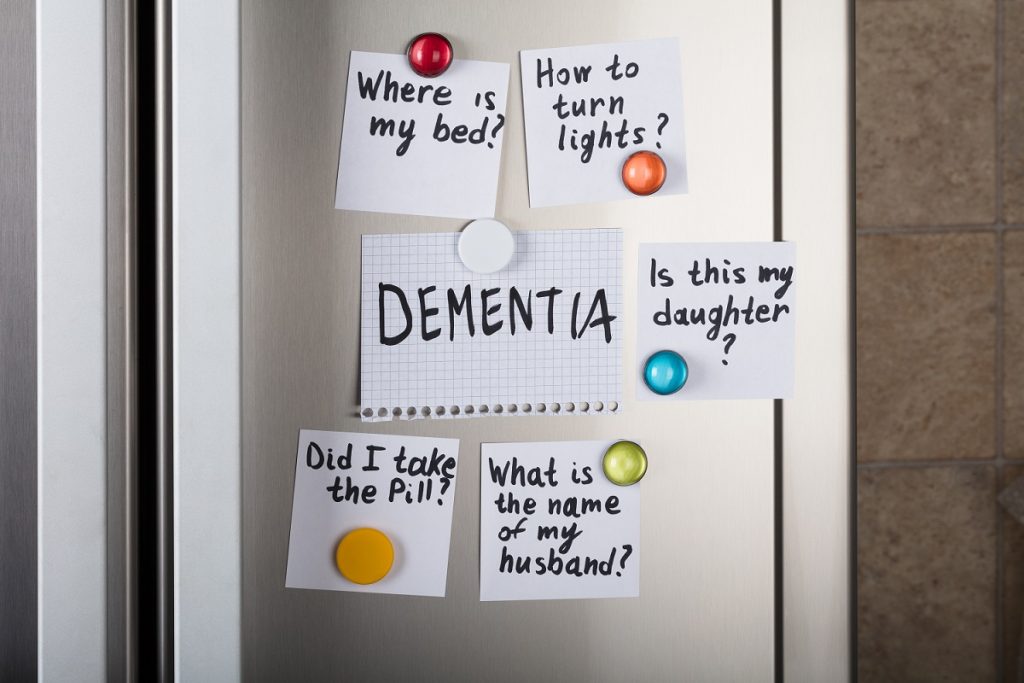When an elderly person fears they are losing mental acuity, they might try hiding dementia symptoms to avoid detection by loved ones. Memory loss is sometimes seen as a loss of what makes an individual unique, so some seniors ignore the problem, try to minimize it, or avoid contact with family to avoid detection.
Experts estimate that about 14 million older people (65 years and up) will live with dementia in the United States by 2060. If Alzheimer’s or other types of dementia affect your loved one, know that it’s only natural for them to hide it — like how any other individual tries to keep their flaws and failures to themselves.
What is Dementia vs. Alzheimer’s Disease?
Brain disorders that involve cognitive impairment fall under the umbrella term “dementia.” People with dementia experience chemical changes in their brains, affecting how they think, reason out, judge, communicate, and recall things — to the point that it impacts their daily lives.
The most common condition is Alzheimer’s disease, which accounts for 60 to 80% of all dementia cases. The patient’s caregiver and family members should know that their cognitive decline will worsen as the disease progresses to later stages.

Hiding Dementia Symptoms – Why Bother?
Dementia diseases can “erode” one’s second-nature behaviors. Over time, this progressive and chronic condition can also make affected individuals unable to complete tasks essential to daily life.
1. Denial and Fear
With no cure yet available, suspecting oneself or getting diagnosed with such a disease can be overwhelming. Denial and fear drive people with dementia to mask their condition. Embarrassment is another reason they may cover up memory problems caused by their disease as ordinary senior moments.
2. Remain Independent
They also want to remain independent and not be sent to a nursing home, a senior living community, or an assisted living facility.
3. Don’t Want To Inconvenience Other People
They may also not want to cause inconvenience to people around them. In-home care can be substantially costly. Meanwhile, family caregiving can be stressful. This stress comes on top of other expenses (e.g., the cost of respite care services, which offer short-term relief to caregivers).
4. Simply Unaware Of Condition
In other cases, the cover-up isn’t intentional. According to research, about 10% of patients with mild dementia and 80% of those with severe dementia have anosognosia. It’s a condition where an individual is unaware of their neurological deficit or mental illness. Consult with a neurologist to rule out this possibility.

What Are The Signs Of Dementia?
Being aware of the different signs of dementia is crucial. Without such knowledge, detecting a loved one hiding dementia can be challenging.
Some of the signs you need to watch out for include:
- Short-term memory loss or lapses
- Difficulty performing tasks (e.g., keeping track of and paying bills, having trouble driving)
- Difficulty communicating (e.g., finding it hard to come up with the right words or follow a conversation)
- Confusion, wandering, and decreased sense of direction
- Poor spatial skills and balance
- Impaired judgment
- Appetite and weight loss problems
- Bladder or bowel incontinence
- Changes in sleeping patterns
- Mood changes and dementia behaviors (e.g., restlessness, hoarding and hiding things, social withdrawal)
Who Is Most Likely To Hide Dementia?
Having dementia is linked to several negative stereotypes. People generally perceive patients as passive, severely impaired, and lacking quality of life.
As dementia is more prevalent among older adults, it’s the elderly populace who is most likely to mask their disease. They may go to great lengths to conceal or disguise the symptoms of dementia that they’re experiencing.

If you’re one of those adult children suspecting their aging parents to be hiding dementia, you should understand the signs of dementia mentioned above. Not every sign of dementia means that institutionalization is just around the corner. Studies by the Alzheimers Association indicate that the disease may take tear as to get to the point where the afflicted person becomes a danger to themselves and require memory care.
What Is The Most Common Symptom Of Early-Stage Dementia?
Dementia is mainly categorized into early, middle, and late stages. According to healthcare experts, early signs of dementia are challenging to identify. The symptoms will be subtle and easily confused with typical age-related changes. Some other conditions masquerade as dementia.
These are some of the early symptoms of early-stage dementia:
- Memory issues and difficulty recalling recent happenings
- Longer time to do everyday tasks or inability to perform them completely
- Increasing confusion
- Poor concentration
- Loss of interest in society and past hobbies or passions

What Is The Most Obvious Symptom Indicating Dementia?
Dementia is not an inevitable part of the aging process. Some older adults meet their end without displaying any dementia symptoms.
To detect dementia in its early stages, you must pay attention to one’s forgetfulness — i.e., if a loved one is frequently showing memory loss involving recently learned information.
You have to be more alarmed if they continue having difficulties remembering important dates and life events — including birthdays and anniversaries. When they also keep relying on memory aids like reminder notes, consider subjecting them to a proper dementia diagnosis.
Doctors diagnose dementia by conducting cognitive and neurological exams, brain imaging techniques, and psychiatric assessments.
What Do People Do To Avoid Detection of Dementia?
The thought of living with dementia can bring forth a plethora of emotions in an individual — from denial to fear to anxiety. This is why some tend to hide symptoms typically associated with Alzheimer’s and other types of dementia.
To help you determine if any loved one is trying to conceal their condition, you must know the common ways they avoid dementia detection, including the following:
1. They Deny Their Memory Lapses
If you ask why they’re being forgetful or frequently getting confused, they’d respond by denying the problem. They may say that their cognitive decline may simply be a senior moment. Their denial can also be paired with anger.
2. They Rely On Others Too Much
People with suspected dementia may enlist others’ constant help to remind them of their appointments or perform house chores. Sometimes, they may also tap their spouse or a close family member to help cover up the symptoms they’re experiencing.
3. They’ve Lost Interest In Their Past Hobbies
They may also refuse to do hobbies involving logical thinking, multi-tasking, and motor skills. For example, they abandon playing board games and doing arts and crafts.
4. They Refuse To Drive Anymore
Driving is a taxing activity for people experiencing dementia symptoms. They may find it hard to recall familiar routes — or even forget how to operate the vehicle.

5. They’re Failing To Keep Their Homes Clean
Dementia patients tend to hoard and hide things. This will lead to the accumulation of clutter, making their living space more prone to accidents. Their struggle with performing daily activities, such as cleaning, further contributes to the untidiness of their home.
6. They Avoid Contact With You And Other Family Members
If it becomes too difficult for them to hide their symptoms, they may avoid talking to their family members, friends, and neighbors. Their fear or embarrassment of getting memory care or dementia care can prompt them to withdraw from society and be isolated.

